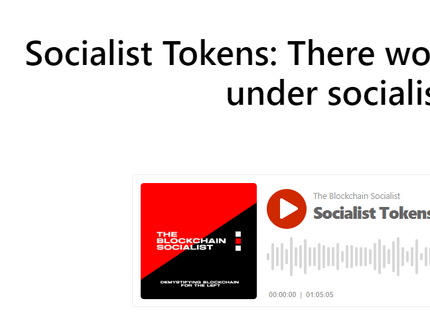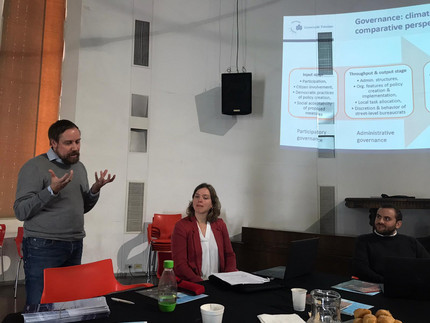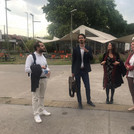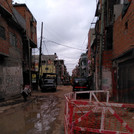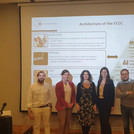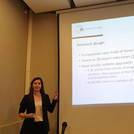News and announcements
4th Annual JCT Workshop: Sustainability in the Anthropocene – June 11-12, 2024 @ University of Potsdam
Location: University of Potsdam, Campus Griebnitzsee, House 7 Room 0.13
To receive the pre-circulated papers for the conference, please register your interest with your name and affiliation at justclimatetransitionsugmailpcom.
Program
11.06.2024
10:00 Welcome (Coffee and tea from 09:45)
10:15 – 11:50 Sustainability and Territorial Rights
Moderator: Kathleen Wallace
Jonathan Kwan (NYU Abu Dhabi):Ecological Sustainability: A People’s Self-Regarding Duty as an Intergenerational Group
I argue for a conception of ecological sustainability as a collective self-regarding duty that a people, understood as an intergenerational group and territorial rights holder, has as a precondition for and a constitutive part of its right to self-determination. This view does not preclude the existence of other duties of sustainability held by other agents or grounded in values distinct from self-determination (e.g., global justice or non-anthropocentric values). Nonetheless, this way of framing a duty of sustainability is distinct from and has certain advantages over other more familiar conceptions. First, here the duty of sustainability is not a duty that one generation owes another, which raises certain puzzles about how to conceptualize the rights of future generations that do not yet exist. Instead, the duty of sustainability is one that a people—already understood as an intergenerational group—owes itself and is grounded in the right to self-determination that a people claims for itself. Both the social ontology of the people as intergenerational and the normative right of self-determination, which involves the right to decide the trajectory of a people’s common destiny, have futural elements built into them that serve to ground a duty of ecological sustainability. Additionally, insofar as the people can be conceptualized as a multispecies community (as many Indigenous conceptions of peoplehood emphasize), this view need not be committed to an anthropocentric conception of sustainability as valuable only for the protection of human interests. Second, my account straightforwardly avoids nonidentity problems, which beset positions that conceptualizes sustainability duties as owed to future individuals, since current environmental policies, while likely necessary conditions for the very existence of certain future individuals, are generally not necessary conditions for future peoples coming into existence. Finally, by grounding a duty of sustainability in the value of self-determination, my view shows that the debate on intergenerational justice should be expanded to consider values other than justice. The point and meaningfulness of sustainability is not always best understood as oriented toward justice (which is often framed in terms of the claims of others competing against ours) but rather is often tied to our hopes and aspirations as a community extended across time and related to other inhabitants of our shared ecosystems.
Kerstin Reibold (UiT Norway): Sustainability, agency, and non-interference. Some mistakes in conceptualizing land.
11:50 – 13:00 Lunch
13:00 – 14:35 Human-nature relationships and their implications for environmental politics
Moderator: Fabian Schuppert
Lukas Tank; Christian Baatz (CAU Kiel): Carbon Dioxide Removal and the Domination of Nature Critique
One of the most fundamental arguments against the use of carbon dioxide removal (CDR) is that doing so amounts to a morally problematic form of asserting dominance over nature. Remarks along the lines of ‘meddling with nature has brought us here, surely engaging in a new form of meddling is not the way forward’ are reported as common by CDR scholars engaging with policy circles and the wider public. More sophisticated versions of the same worry are reported in the academic literature, sometimes, but not always, taking the form of an accusation of hubris (e.g. Jamieson 1996, Preston 2011, Heyward 2019). In this talk we aim to show why an argument along these lines is not convincing as a blanket critique of using CDR. Our response comes in two steps: first of all, what must be admitted is that intervening into the Earth’s climate system is indeed a far-reaching intervention into nature. However, CDR is (or at least can be) a particular form of intervening into nature, namely a remedial one that comes in response to our present interference in the form of anthropogenic climate change. Even if one is committed to a position which states that ideally humans should ‘let nature be nature’ as far as that is still possible, remedial interventions plausibly should be exempted from critique. Second, proponents of the domination of nature critique have responded to this move by pointing out how CDR, even though remedial in character, is especially problematic since it constitutes an intentional intervention into nature. CDR users intervene into basic mechanisms of the Earth system not just knowingly, but precisely with the aim to alter them from their current course. We counter this point by explaining how there is no good reason to think that remedial actions should be considered problematic just because of their intentional character. Considerations refering to the way CDR interacts with nature may very well guide us in choosing which forms of CDR (not) to pursue, but are not fit to serve as a blanket critique of all forms of CDR.
Giulia Leonetti, Viola Di Tullio (IUSS Pavia): Rethinking Sustainability through Ecological Justice: A Focus on Biodiversity, Plants, and Climate Change
In the context of ecological justice, it is crucial to rethink a concept of sustainability suitable to address the issue of climate change. Humans and all the other species on the Earth are strongly interconnected (Flint et al. 2013). For this reason, harm to one part would damage the whole system. In this work, we will first discuss the value of biodiversity and the relationship between biodiversity and ecological justice, which are closely interconnected (Washington et al. 2024). Due to the biodiversity loss, the characteristics and the balance of ecosystems are changing. Consequently, the notion of ecological justice becomes crucial. In addition, practices of environmental injustice such as deforestation and pollution make biological communities vulnerable, demanding new ethical approaches. We will argue that to address these issues we should adopt a non-anthropocentric approach (Kopnina et al. 2023) to sustainability. Then, we will discuss the moral consideration of natural entities, such as plants, in the framework of ecological justice. In the second part, we will debate the role of plants (Kallhoff et al. 2018) in biodiversity conservation practices and we will argue that plants are active participants rather than passive objects in the making of ecosystems and landscapes (Sullivan 2010). We will conclude that this perspective is crucial in rethinking a concept of sustainability fit to address the challenge of climate change.
14:50 – 16:25What and whom should sustainable policies protect?
Moderator: Clare Heyward
Daniel Petz (Universitas Gadjah Mada): The currency of sustainability: Basic needs or capabilities?
Recent decades have seen a backlash against utilitarian and monetary approaches to measure well-being and alternative currencies of justice have gathered increasing traction in the sustainable development discourse. In particular, basic needs and capabilities have been brought forward as alternatives. The Brundtland report, a founding document of the sustainability discourse, argues, for example, that both the needs of present and future generations need to be met through sustainable development. Thus, needs have never fully disappeared from the sustainability discourse and in recent years gained quite some traction in scholarly circles (for example, Gough, 2017; Millward-Hopkins et al. 2020). Alternatively, both in academia and practice, capabilities have been proposed as a fitting currency to measure human development and to deal with sustainability issues (for example, UNDP 2020, Raworth 2021). Building on the background assumption that sustainability in the coming decades will mean significant change of social, consumption and mobility patterns, this paper discusses advantages and challenges of either currency when applied to sustainability in the context of the climate crisis. While likely providing viable alternatives, it argues that there might be pitfalls in using either currency, depending on how the currencies are specified, with either currency having the potential to be abused to foster the interests of current generations over those of future generations. Looking at a number of specific examples it discusses how certain challenges and pitfalls could be addressed via appropriate specification of lists, thresholds, and distributive rules to handle issues of scarcity.
Felix Westeren (LSE): Future Autonomy and Trusteeship
Our generation is faced with a number of important future-affecting decisions. Some of the most important concern our response to climate change. How quickly we reduce our emissions, how well we can protect ecosystems from the effects of climate change and what things we choose to preserve into the future will have a very significant impact on the lives people are able to live in the future. Even relatively small policy changes can have large future effects. The contention of this paper is that, if we (as we should) care about the ability of future people to lead autonomous lives, then we need some method of judging our actions for their effects on future autonomy. I propose and defend one such principle, the Trusteeship Principle. I also defend the idea that future people are owed, as a matter of justice, extensive autonomy rights that go beyond the satisfaction of their basic needs. Indeed, the Principle I defend depends on an expansive but, I think, defensible view of the autonomy-related interests and rights of future people. In particular, I defend the idea that future people have rights against us interfering with the formation and the pursuit of their conceptions of the good. We violate the former rights when we improperly influence the conceptions of the good of future people, and the latter when we do not leave them the options they need for the effective exercise of their autonomy. I argue that since future people do not yet exist, we must hold these rights in trust on their behalf, and that this has important consequences for how we ought to approach decisions that will affect them.
12.06.2024
09:45: Coffee and tea
10:00 – 11:30: Legal and societal transformations for sustainability
Moderator: Petra Gümplová
Michael Keary (Research Institute for Sustainability–Helmholtz Centre Potsdam, Germany): Transformational Technology and the Green Political Community: Rethinking Green Political Theory for the Digital Transition
Digitalisation is one of the major processes shaping the contemporary world. It is also a major research focus across a whole range of academic disciplines. Yet political theory has little to say about it. It is especially surprising that green political theory has yet to engage in significant analysis of it. Digitalisation is seen by countless scholars and policymakers as key to resolving the environmental crisis. Moreover, digitalisation is heralded as a new technological ecosystem, one that is replacing the technology against which green thought has defined itself from its beginning. This article thus asks what digitalisation means for green political theory. To answer, the article employs a concept-based approach to ecologism, inspired by Freeden’s analysis of ideology. It finds the most optimistic appraisals of digitalisation’s green credentials to be dubious, but also that some digital technologies may have a place in a green political community. Digitalisation enlivens the debate about the proper scale of a green political community, challenges advocates of a green deliberative democracy, and forces us to reengage with debates about the meaning of nature. Throughout, the article highlights the many questions digitalisation raises for green beliefs and values and describes the research agenda that must be pursued if greens are to answer them.
Jeremy Moss (University of New South Wales): Climate and sustainability
This paper will discuss the challenges of climate-related losses of sustainability. The paper will discuss two normative issues for discussions of sustainability loss. The first concerns what kind of loss it is and how it is a harm to agents. In particular, how climate induced sustainability losses compound other harms. The second issue concerns how to attribute responsibility for climate-related sustainability losses where climate impacts compound the losses through other non-climate pathways. The paper will argue that an understanding of the compounding nature of climate harms is necessary to fully understand the harms involved in the loss of sustainability. The paper will focus on several examples of sustainability loss to highlight the issues.
11:30 – 12:30 Lunch
12:30 – 14:05: Holding high-emitters responsible
Moderator: Kerstin Reibold
Fausto Corvino (UC Louvain): The normative case for carbon limits
In the climate ethics literature, luxury emissions are usually described in contrast to subsistence emissions, i.e. those emissions necessary to meet a set of basic needs. The normative claim that usually accompanies the distinction between luxury and subsistence emissions is that it is unjust to realise the former if it takes away carbon space from the latter - and the recent philosophical debate focuses on empirical questions about whether and to what extent it is still necessary to emit GHGs to meet basic needs, and what part of the GHG budget must be reserved for subsistence emissions. This article argues that there are compelling normative reasons to implement carbon limits, i.e. to prohibit and/or strongly discourage luxury emissions, regardless of whether this serves to free up space for subsistence emissions or not. First, some emission-generating functionings of the rich produce a disproportionate amount of GHGs without generating significant increases in welfare, if we measure it in terms of multi-level capabilities, and this is a gross waste of the GHG budget. Second, many of the emission-generating functionings of the rich are highly positional. Therefore, foreclosing the capabilities of the rich to realise some luxury functionings is a way of safeguarding the GHG budget at zero or near-zero cost to society. Thirdly, the luxury emissions associated with the visible functionings of the rich create behavioural externalities in that they drive the immediately lower income group, i.e. the near-rich, to realise larger (and thus in many cases more polluting) functionings in order to maintain their social status, and thus down the social scale in an expenditure cascade. Because of this trickle-down effect, luxury emissions create a double climate problem. In the absence of ambitious mitigation policies, they push the non-rich to expand their carbon footprint. In the presence of ambitious policies, instead, such as a relatively high and uniform carbon price, luxury emissions (which the rich can defend because of their wealth) make it more costly for the non-rich to reduce their carbon footprint because of the resulting loss of social status (measured in terms of distance from the top income group).
Eugen Pissarskoi (Karlsruhe Institute of Technology): Non-compliers with climate mitigation obligations: how to identify them
A climate policy goal such as the 1.5°C target can be achieved only collectively, that is, only if a sufficiently large group of agents - individuals, corporations, national states - contribute their fair share towards the goal, i.e. that they appropriately reduce their greenhouse gases (GHG) emissions. In the field of climate politics, not all nation states contribute the share to the collective goal which they ought to contribute (van den Berg et al. (2020); up-to-date data on: climateactiontracker.org). Under these circumstances, the question arises what moral agents who are interested in meeting the requirement from intergenerational justice - the compliers - ought to do. Some scholars have argued that compliers have the duty to take up the slack, i.e. to contribute more to the common goal than the share one is obliged to under full compliance (e.g. Stemplowska 2016). Others have defended the opposite claim that the obligations of the compliers do not change but that rather the overall moral obligations change - regrettably as it is, we must accept that the overall moral goal cannot be collectively achieved (e.g. Miller 2011). Focusing on climate politics, Simon Caney (2020) has argued for a prima facie `right to resist moral injustices' which provides a normative justification for a further option of reaction which I call `urging': undertaking collective action to bring non-compliers to act according to what is morally required from them (c.f. Caney, 2016). In this text, I address a challenge for the option of urging which arises when it comes to identification of non-compliers. The challenge results from disagreements about moral duties to climate mitigation of particular nation states.
A necessary condition for legitimacy of urging an agent, as I shall argue, is the agent's contribution to what Rawls (1971, 57) has called `substantial and clear' injustice. However, justification of the individual obligation to climate change mitigation presupposes two normative premises which are controversial both in public and academic debates: these premises specify a principle for distribution of future risks and a principle for distribution of mitigation burdens. Because of this disagreement, it remains unclear whether a moral agent who complies with a mitigation share consistent with some of the controversial principles clearly commits an injustice. Therefore it remains unclear whether the necessary condition for legitimacy of urging is met. Germany is an instance of this ambiguity: according to the declared plans of the German Federal government, it aims at cutting national emissions in an amount which complies with its fair-share based on some principles for global and intertemporal distribution. However, Germany's plans do not comply with their fair-share derived from other, prima facie reasonable, principles for global and intertemporal distribution. In this paper, I specify and defend two second-order principles which justify how to identify non-compliers in the light of a disagreement about principles for distribution of intertemporal and global obligations.
Financed by:
LS Politische Theorie, University of Potsdam
The Environmental Philosophy Group, UiT – The Arctic University of Tromso
Workshop on citizen participation in Central and Eastern Europe
The chair for political theory at the University of Potsdam is hosting a small informal workshop on citizen participation in Central and Eastern Europe on 19 September 2023 (at the Griebnitzsee-Campus of the university in Potsdam/Germany).
The aim of the workshop is to bring together diverse perspectives on the role of participation formats in the context of policy-making in Central and Eastern Europe, with a special focus on climate policy. However, insights from other citizen participation experiences are also welcome.
Specifically, the workshop will consist of the following parts:
- Reflection on existing (and past) participation formats in practice (e. g. climate assemblies; citizen juries, etc.)
- Discussion of the relevant normative criteria for ascertaining what good citizen participation is a) in general and b) regarding climate policy?
- What are future developments in the field of citizen participation and which design and implementation issues should be taken into account when new citizen participation formats are created?
Program
September 19th, Venue: University of Potsdam, Campus Griebnitzsee, House 6, Room S 15
10:30 - 11:00 Welcome
Session 1: Reflection on existing (and past) participation formats in practice
11:00 - 11:45 Janina Walkenhorst: Citizen Participation regarding Climate Politics from a Cross-Comparative Perspective
11:45 – 12:30 Eva Bördös: Climate Assemblies in Hungary
Lunch
Session 2: Discussion of the relevant normative criteria for ascertaining what good citizen participation is a) in general and b) regarding climate policy?
13:45 – 14:30 Gökhan Orhan: Citizen Participation in Turkish Environmental Policy. Citizen Participation in Turkish Environmental Policy: Limited Avenues and Rugged Paths
14:30 – 15:15 Fabian Schuppert:What is the normative added value of citizen participation in the context of climate policy making?
Coffee
Session 3: What are future developments in the field of citizen participation and which design and implementation issues should be taken into account when new citizen participation formats are created?
15:45 -16: 30 Paulina Pospieszna: Deliberative Instruments: Potential, Impact, and Actors
16:30-17:00: Final discussion
Joint Dinner at Piazza Toscana
Contact: Janina Walkenhorst (janina.walkenhorst@uni-potsdam.de)
3rd Annual JCT Workshop: Future Paths for staying within the planetary boundaries – June 2-3, 2023 @ University of Potsdam
The workshop is the third in a series of annual workshops of the network ‘Just Climate Transitions’ (https://justclimatetransitions.com/). The network and workshop bring together scholars that are interested in exploring normative and conceptual questions around social, economic, cultural, and political transitions due to climate change mitigation and adaption. While climate ethics are a well-established and important field within applied ethics, there has been less focus on the conditions of just transitions (vs end state theories of climate justice or backward-looking reparative theories). However, natural and social sciences point towards rapid societal changes that take place or are possible when societies deal with the effects of ongoing climate change. Often, the required changes have a high societal impact. Whole fields of employment, such as the coal and oil and gas industry, might disappear while other fields, such as wind and solar power, will be strengthened. Settlements might have to be relocated due to flood risk or desertification. Widespread everyday behaviors such as using cars, consuming energy, and eating meat might become more regulated or at least de-incentivized due to their impact on climate change. All of these changes produce burdens for some but often also gains for others. Moreover, they lead to a restructuring of our societies on a deep level – economic, social, and even cultural. We are interested in exploring how climate change responses (should) change how we relate to underlying, foundational concepts such as nature, time, autonomy, and responsibility but also how the burdens, and possible benefits, of material changes, e.g. a restructuring of the economy or land loss, can be justly distributed.
Attendance is free, but please register by 01.06.23: https://forms.gle/rVarQuRrxRW5stWe7
Program
Day 1 (02.06.2023)
The first day critically examines some of the concepts and ways of thinking that become especially relevant in the context of responding to global warming and the changes it brings.
09:30 – 10:00 Welcome
10:00 – 11:00 Darrel Moellendorf: Solidarity Failures at the Dawn of the Anthropocene.
A concept of solidarity emerged in the 19th century that remains valuable for international cooperation in the Anthropocene. The paper offers an account of the concept, especially as it applies to reasons for action. Solidarity provides agents with a distinct source of reasons to act when there is something to be gained by the successful struggle in the pursuit of a common interest. This is especially important when the risks of such action are significant. The paper argues that in the case of three important problems of the Anthropocene, climate change mitigation, Covid 19 vaccine distribution, and climate change adaptation, the countries of the world have failed to act on reasons of international solidarity with terrible effect. It diagnosis the reasons for this failure as lying in features of the international state system and private economic interest.
11:15 – 12:15 Maria Skoutaridou: “It is my fault”. Climate change and the atomised self: A response to Kingston & Sinnott-Armstrong
Maria Skoutaridou’s paper engages with one such hindrance. She argues that even if it is collective, rather than individual actions, that bear the most moral weight in climate change discussions, it is still important to understand what has led us to our current predicament and how we can prevent further damage to the environment. She diagnoses as the root problem the concept of the atomised self, which is prominent in liberal democratic societies and which prevents us from perceiving ourselves as part of a social whole, thus having duties towards the survival of the collective.
12:30 – 13:30 Anna Wienhues: The ‘Global duties – Local burdens’ Problem for Just Biodiversity Conservation
In her paper, Anna Wienhues approaches the problem of an existing discrepancy between global justice theorising and local conditions which is still undertheorized in the wider debate around just biodiversity conservation and burden-sharing of its costs. Taking a common approach to environmental and interspecies distributive justice that relies on the distribution of ecological space as an example, she explains why this problem arises from the incongruity between the currency of justice (ecological space) in the global-abstract and the local-particular (the conceptual problem). Cultural costs, in turn, are argued to be essential to understanding the central moral concern at stake.
13:30 – 14:45 Lunch
14:45 – 15:45 Kendall Gardner: Unstable Geography: Creating a Critical Theory of Land in the Age of Anthropocene
As small-island states and coastal communities face permanent inundation, political theorists have taken up the challenge of forming a cogent theory of climate displacement, mostly focusing on climate migration, with increasing urgency. However, though this literature recognises a background condition of “territorial instability,” it largely fails to engage with this condition on its own terms. This paper seeks to redress this issue by integrating the empirical reality of climate-related land loss into our understanding of land as a political and economic concept. In other words, this paper aims to take impermanence seriously as one of land’s core characteristics and asks how we might rethink our land-based political assumptions to accommodate this reality. By focusing on the integral role of land in political theories of property and sovereignty, Kendall Gardner aims to unveil a reliance on an imagined condition of stability in liberal thinking, which ultimately obscures the fundamental character of land as unstable, changing, and fluid.
To highlight the stakes of this argument, Kendall Gardner will engage with the work of Anna Stilz, who crafts a defence of the territorial state system that attempts to accommodate and resolve the challenges posed by climate displacement. However, it will be argued that her argument relies upon the very conditions of stability she aims to theorise beyond. Finally, through postcolonial critique, the paper aims to show that the liberal deployment of imagined conditions of land stability is no accident. Instead, it will be argued for the coterminous construction of the liberal land variable through colonial dispossession, a process mediated by abstraction, alienation, and imagined (stable) geography.
16:00 – 17:00 Lorina Buhr, Ben Hofbauer: Irreversibility as a key concept for research on climatic and environmental changes and boundaries
Lorina Buhr and Ben Hofbauer trace the intellectual history of another concept that has risen to prominence in climate debates: irreversibility. They examine the concepts usages, semantic functions, and conceptual contexts of the term irreversibility, as well as normative implications and strategies in the usage of the terminology. Their paper systematically records and analyzes how a concept of natural philosophy, theoretical physics, and chemistry has found its way into debates on human-induced environmental change and which conceptual and normative questions this raises.
18:00 Dinner
Day 2 (03.06.2023)
The second day takes a closer look at conditions for just climate transitions and the principles of burden-sharing and responsibility in this context.
10:15 – 11:15 Jeremy Moss: Who’s to Blame? Distributing Responsibility for Climate Harms?
Jeremy Moss also discusses the question of responsibility but focuses on what he calls ‘indirect emitters.’ His claim is that philosophers and others have misunderstood how responsibility for climate harms ought to be attributed, that the responsibility of indirect emitters is high, and that taking their contribution into account greatly alters the allocation of responsibility between different actors and, importantly, the consequences that follow for climate action.
11:30 – 12:30 Laura García Portela, Eike Düvel: Normative emissions accounting. Who is the normatively relevant polluter?
Laura Garcia Portela and Eike Duvel’s paper directly connects to this discussion as they analyze who the normatively relevant polluters are. They criticize approaches that hold that emissions accounting mechanisms should be guided by broader justice considerations, such as who has the capacity to bear climate policy-related burdens that would follow the allocation of emissions. Instead, they argue, the question of who the normatively relevant polluter is should be central as it is the normative foundation for the Polluter Pays Principle which in turn is central for posing the emissions accounting question in the first place.
12:30 – 13:45 Lunch
13:45 – 14:45 Elisa Paiusco: A Capabilities Approach to Carbon Dioxide Removal
Elisa Paiusco broadens the debate by including future generations into the debate of who is responsible to do what and how much. She posits that the technology of carbon-dioxide removal will become necessary to stay within the planetary boundaries but poses risks to basic needs of either current or future generations. She proposes that a sufficientarian focus on poverty alleviation is insufficient in this debate and should be replaced by a capabilities approach to analyse the needs and risks of capability failures in mitigation scenarios involving overshoot.
15:00 – 16:00 Steve Vanderheiden: Reconfiguring Progress for a Post-Growth Planetary Future
Steve Vanderheiden takes issue with a specific aspect of economic theory, progress as quantitative economic growth, which he sees as influencing even non-economic ideals and concepts of progress. Building on the idea of sustainable progress, he examines several of these ideals and economic progress surrogates in terms of their recognition of planetary boundaries and their incorporation of ecological limits but also in their relationships with ideals of justice and equality. He identifies several sticking points, where the ideal each offers retains some residue of the growth imperative that it aims to displace, noting the importance of this project for social and political theory while also suggesting strategies for constructively continuing it.
This conference is supported by The Society for Applied Philosophy and the Gesellschaft für Analytische Philosophie.
Podcast Episode "Socialist Tokens: There would be no taxes under socialism" with Philipp Dapprich
Dr. Philipp Dapprich was a guest on "The Blockchain Socialist" podcast, which explores the intersection of blockchain and leftist politics. The conversation was about a socialist interest in economic planning and the ideas Jan Philipp Dapprich put forward in this matter in his paper "Tokens make the world go round: socialist tokens as an alternative to money" (2022) on socialist tokens.
Find the podcast here.
Save the date: In-Person Author-meets-Critics Workshop with Robin Hahnel on his recent book Democratic Economic Planning - Jun 8-9, 2023
Schedule to be announced.
For more information, please contact: dapprich@uni-potsdam.de.
The workshop is supported by theFritz Thyssen Foundation.
Participatory Structures in the Context of Climate and Urbanization Strategies: C40 in Buenos Aires
From October 18 to 22, the Chair of Political Theory was invited by the Buenos Aires City Council (together with the Chair of Politics, Administration and Organization) to take part in the C40 city program. There we were asked to present first results of our research project on the role of citizen participation on climate strategies in metropolitan regions.
While we were there we were also given the opportunity to visit the urbanization project in Villa 20. In this district of Buenos Aires - which is especially affected by poverty and precariousness - a project team together with the administration and above all the local citizens has launched a concept to rebuild the district and create new perspectives for the residents. The project is not just about building new streets and houses but creating a livable neighbourhood, f.e. by building schools, sanitary facilities or planning facade greenings as a climate adaptation measure. Of particular interest to us was how the organizers succeeded in shaping the participatory process in such a way that the citizens were not only able to express their preferences, but were also able to actively participate in the project themselves and thus identify with it and actually use the existing offerings.
At our partner university Universidad Nacional de San Martín, we were able to present our research project within the framework of the Einstein Climate Change Center of Public Policy and Human Settlement*. Afterwards, we discussed the different criteria for representation within participation processes as well as the objectives of citizen participation with scientists of the university and later with students. On site, we were also able to strengthen our strategic cooperation, for example by planning further cooperation projects with our colleagues from Argentina.
Especially important for the partnership is not only the scientific exchange of the staff but also the intercultural exchange of the students. If you are considering spending one or two semesters abroad at the Universidad Nacional de San Martín, you can find out more about what the University of Potsdam has to offer here.
*affiliated with the Climate Change Center Berlin Brandenburg Berlin.
State teaching award 2022
The Ministry of Science, Research and Culture of the State of Brandenburg has selected the seminar "No Refuge - Refugee Rights and Border Regime" initiated and conducted by Dr. Kerstin Reibold as a prize-winning project! The theme of this year's Landes-Lehrpreis is "Social interaction in teaching and learning". The chair is very happy about the award and congratulates Dr. Reibold! The award ceremony and presentation of the certificate by the Minister of Science, Research and Culture will take place on 24th of November.
The seminar "No Refuge - Refugee Rights and Border Regime" dealt with the question of refugee policy from a normative perspective. For this purpose, the book 'No refuge - Ethics and the Global Refugee Crisis' by Serena Parekhs was read and discussed. The book discusses the situation of refugees who do not find safe refuge in refugee camps, in urban slums or on the steady onward journey. It analyzes how the lack of access to asylum creates a second refugee crisis and discusses what moral claims refugees in such situations have to the international community.
The seminar adressed the following questions:
Which moral rights ground refugee rights?
How well are these moral rights protected in the current international system?
What changes would be needed to effectively protect these rights and what are the main (political, moral, economic…) challenges to do so?
Which/ what other moral rights conflict with refugee rights?
(How) Can these rights conflicts be resolved?
Which parts of these questions aim at a normative answer and which ones at an empirical answer?
In the course of the seminar, the students were guided through the process of preparing an independent contribution to a scientific debate. In doing so, the students worked together through the various steps from finding a research question to research work to presenting their own contribution and revising it. The seminar was accompanied by a writing consultation and concluded with a student conference where the students had a direct exchange with researchers working on migration and refugee rights.
Award for Excellent Teaching of the Faculty of Economics and Social Sciences 2021
Dr. Kerstin Reibold was awarded the 2021 Teaching Prize of the Faculty of Economics and Social Sciences. We are very happy and congratulate her!


